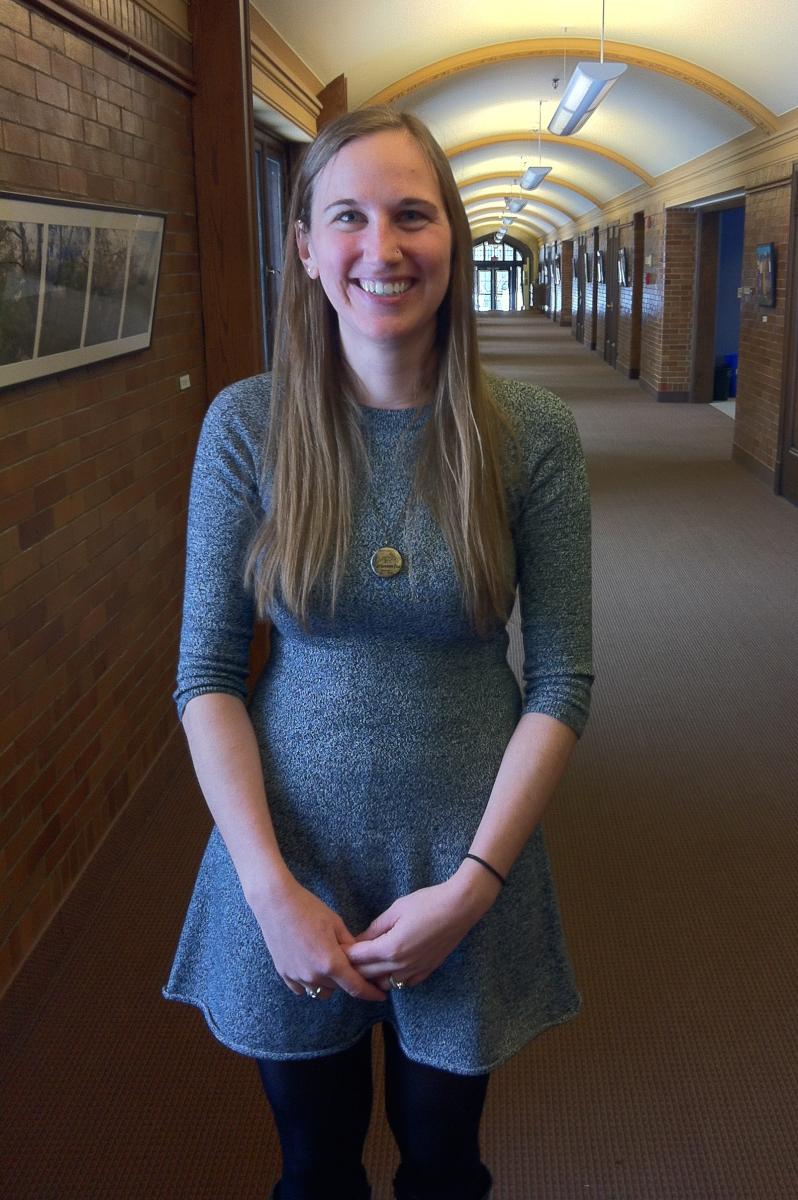

Tiffany Carther-Krone: From the swimming pool to a PhD
.jpeg)
Tiffany Carther-Krone's PhD research involves using this
MRI machine in Thunder Bay, ON. (Click to enlarge.)
How does an aspiring music teacher end up doing a PhD in neuroscience? CMU’s meal plan is part of the answer.
When she moved on campus to study at CMU, Tiffany Carther-Krone (nee Lazar, OT ’04, CMU ‘08) enjoyed eating in the university’s dining hall. In an effort to combat the “Freshman 15,” Carther-Krone started swimming at a local pool when she wasn’t taking music classes.
After two years of studying music and some experience substitute teaching in her hometown of Flin Flon, MB, she realized a career as a music teacher wasn’t for her. She decided to pursue another one of her interests: mathematics.
In the meantime, her interest in swimming had led her to become a lifeguard. While taking an emergency medical responder course to supplement her ongoing lifeguard training, Carther-Krone developed a love for neuroanatomy and the way the brain works.
She was able to pursue this interest in The Philosophy of Math, an interdisciplinary course she took during her fourth year at CMU.
“I studied artificial intelligence and how the mind could be potentially modeled as a machine, using mathematics to support my argument,” says Carther-Krone, who is currently working on a PhD in brain and cognitive sciences through the psychology department at the University of Manitoba. “I realized how much I wanted to continue learning about how the brain works.”
After graduating from CMU, Carther-Krone enrolled at the University of Winnipeg and went on to graduate with a Bachelor of Science (Honours) in biopsychology.
While working on her honours thesis, Carther-Krone did some brain imaging work using DTI (diffusion tensor imaging).
“I realized how much I loved looking at the neuroanatomy using DTI,” Carther-Krone says.
Her advisors at the University of Winnipeg connected her with professors at the University of Manitoba who shared Carther-Krone’s interests, and she began her master’s degree.
Carther-Krone’s master’s research looked at whether or not individuals with autism are able to group elements of their environment into a whole at a pre-attentive level—that is, before they’re even aware of it.
Her findings can be applied to clinical populations, such as those with autism, to help address some of the larger symptoms you see in these individuals.
Today, as a PhD student, Carther-Krone is building on the research she did during her master’s using another brain imaging technique, fMRI (functional magnetic resonance imaging).
FMRI measures brain activity by detecting changes associated with blood flow. It produces a dynamic image that shows researchers which parts of the brain are activated when the subject is doing specific tasks.
“I’m really privileged that a lot of the research I do involves one-on-one time with my participants,” Carther-Krone says, adding that she has worked with a variety of different populations, including individuals with autism, elderly people, and undergrad students. “Everyone is so unique in their own way. It gives me an opportunity to talk with them and get to know them.”
She also enjoys looking through the statistics once she has collected her data.
“I love being able to learn and discover new things, and then taking that information and sharing it at conferences or within the university,” she says.
Carther-Krone thinks back on her time at CMU fondly. Not only did the university’s meal plan lead, in some bizarre way, to her career in neuroscience, but the courses she took stretched her and help her develop a strong work ethic.
“I had conversations about so many different topics from so many different angles,” she says of her time at CMU. “Not everybody thinks the same way and that’s so important to (realize) early on because when you get into a career like science, you get a lot of different (perspectives) on a lot of different topics that you’re looking at."
Carther-Krone is thankful for the relationships she started at CMU.
“The community of people that I grew up with at CMU have had a huge influence on where I’m at in my life right now,” she says. “I met some of the most amazing people that I’ve ever met in my life while at CMU. They are still some of my best friends to this day.”
One of those friends is a PhD student in theology, and the two lean on each other for support while navigating careers in academia.
Occasionally, they muse about how much fun it would be if one day they both got jobs teaching at CMU.
No matter where she works after finishing her PhD, Carther-Krone hopes to become a professor and have access to brain imaging facilities so she can continue her work.
By the time she finishes her PhD, she will have been a post-secondary student for 16 years. Even then, it won’t have been enough learning to satisfy her curiosity.
“One thing I yearn for is to continually increase my knowledge on subjects I’m passionate about,” Carther-Krone says, adding with a laugh: “Even though I might graduate some day, I’ll still be a forever student.”
Printed from: www.cmu.ca/community/blog/168

